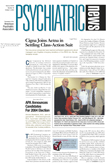In one of the congressional responses to a growing crisis in accessing and paying for health care, Rep. John Conyers (D-Mich.) introduced the United States National Insurance (USNI) Act (HR 676) in February. The bill, which reflects many ideas in the
JAMA proposal (see
article above) and has 28 cosponsors, would expand the Medicare program to cover all residents of the United States.
The USNI program would cover all “medically necessary services.” Among the types of care mentioned are primary care, inpatient and outpatient care, mental health services, substance abuse treatment, prescription drugs, emergency care, durable medical equipment, dentistry, and eye care.
Patients would have their choice of physicians and other health care personnel, hospitals, and clinics. The federal government would determine reimbursement rates and would negotiate with pharmaceutical companies to set prices for prescription drugs. Copayments and deductibles would not be permitted. Private insurance companies would be prohibited from offering coverage that duplicates the benefits offered through the program. The principal source of funding would be an employer payroll tax, which, according to the bill’s proponents, would be offset by the termination of the employers’ share of the costs of private health insurance.
The bill has been referred to the House Energy and Commerce Subcommittee on Health.
In another response to the escalating health care crisis, Rep. James McDermott, M.D., (D-Wash.), who supports HR 676 and is the only psychiatrist in Congress, introduced the American Health Security Act (HR 1200) in March. The bill, which has 32 cosponsors, would establish a national and universal health program that would be funded by the federal government and administered by the states.
The newly created American Health Security Standards Board would develop policies and procedures for enrollment, benefits, provider participation, national and state funding levels, and other functions.
The bill would prohibit deductibles, coinsurance, and copayments for acute care and preventive benefits and would prohibit clinicians from charging a patient for covered services and private insurance that duplicates benefits provided by the legislation.
The bill would be funded through a payroll tax paid by employers, a health care income tax on individuals, and an increased tobacco tax. Those funds would go to the American Health Security Trust Fund, which would also receive specified tax liabilities and current receipts related to federally funded programs that would be superseded by the legislation.
The bill was referred to the health subcommittees of the House Ways and Means Committee and the House Energy and Commerce Committee.
